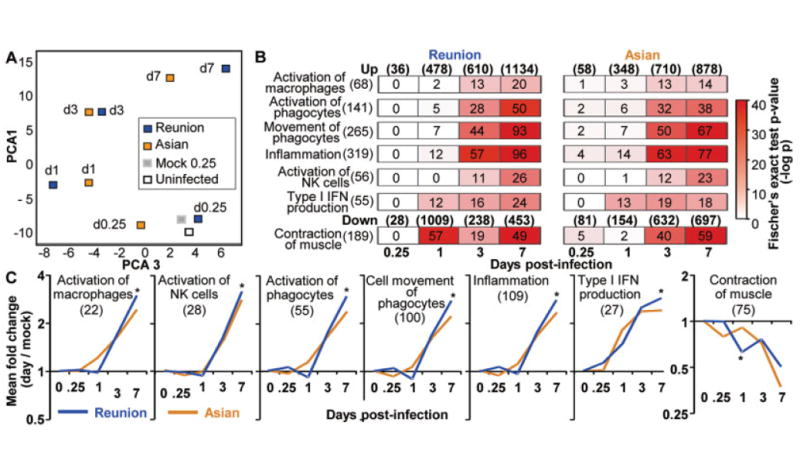Gene profiling of Chikungunya virus arthritis in a mouse model reveals significant overlap with rheumatoid arthritis.
Chikungunya virus (CHIKV) is a mosquito-borne alphavirus that causes a chronic debilitating polyarthralgia/polyarthritis, for which current treatments are often inadequate. To assess whether new drugs being developed for rheumatoid arthritis (RA) might find utility in the treatment of alphaviral arthritides, we sought to determine whether the inflammatory gene expression signature of CHIKV arthritis shows any similarities with RA or collagen-induced arthritis (CIA), a mouse model of RA. Using a recently developed animal model of CHIKV arthritis in adult wild-type mice, we generated a consensus CHIKV arthritis gene expression signature, which was used to interrogate publicly available microarray studies of RA and CIA. Pathway analyses were then performed using the overlapping gene signatures. Gene set enrichment analysis showed that there was a highly significant overlap in the differentially expressed genes in the CHIKV arthritis model and in RA. This concordance also increased with the severity of RA, as measured by the inflammation score. A highly significant overlap was also seen between CHIKV arthritis and CIA. Pathway analysis revealed that the overlap between these arthritides was spread over a range of different inflammatory processes. Involvement of T cells and interferon-γ (IFNγ) in CHIKV arthritis was confirmed in studies of MHCII-deficient mice and IFNγ-deficient mice, respectively. These results suggest that RA, a chronic autoimmune arthritis, and CHIKV disease, usually a self-limiting viral arthropathy, share multiple inflammatory processes. New drugs and biologic therapies being developed for RA may thus find application in the treatment of alphaviral arthritides.
Authors
Helder I Nakaya; Joy Gardner; Yee-Suan Poo; Lee Major; Bali Pulendran; Andreas Suhrbier
External link
Publication Year
Publication Journal
Associeted Project
Systems Immunology of Human Diseases
Lista de serviços
-
RASL11A, member of a novel small monomeric GTPase gene family, is down-regulated in prostate tumors.RASL11A, member of a novel small monomeric GTPase gene family, is down-regulated in prostate tumors.
-
Splice variants of TLE family genes and up-regulation of a TLE3 isoform in prostate tumors.Splice variants of TLE family genes and up-regulation of a TLE3 isoform in prostate tumors.
-
Concepts on Microarray Design for Genome and Transcriptome AnalysesConcepts on Microarray Design for Genome and Transcriptome Analyses
-
The iron stimulon of Xylella fastidiosa includes genes for type IV pilus and colicin V-like bacteriocins.The iron stimulon of Xylella fastidiosa includes genes for type IV pilus and colicin V-like bacteriocins.
-
Origins of the Xylella fastidiosa prophage-like regions and their impact in genome differentiation.Origins of the Xylella fastidiosa prophage-like regions and their impact in genome differentiation.
-
The role of prophage in plant-pathogenic bacteria.The role of prophage in plant-pathogenic bacteria.
-
Genetic control of immune response and susceptibility to infectious diseases.Genetic control of immune response and susceptibility to infectious diseases.
-
Building capacity for advances in tuberculosis research; proceedings of the third RePORT international meeting.Building capacity for advances in tuberculosis research; proceedings of the third RePORT international meeting.
-
São Paulo School of Advanced Sciences on Vaccines: an overview.São Paulo School of Advanced Sciences on Vaccines: an overview.
-
A reasonable request for true data sharing.A reasonable request for true data sharing.

